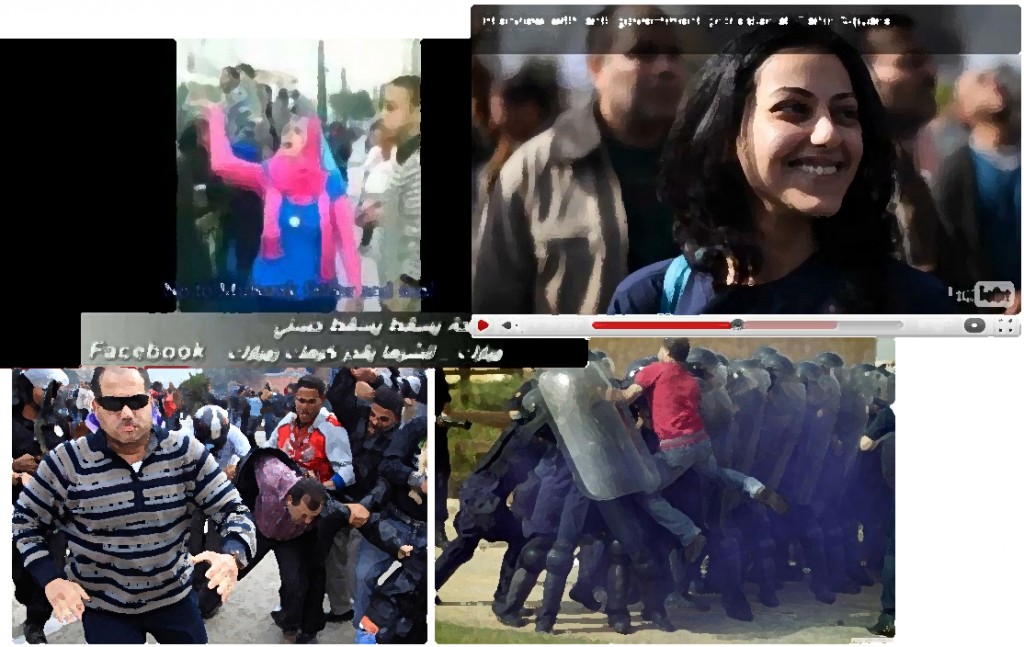Mondoweiss has been a great source of information about the historic events of the past week in Egypt, with a wide range of contributors offering frequent posts that paint the scene about as well as any single Web site/blog/whatever. When Mondoweiss was down on Saturday morning, I really felt a small twinge of panic, as though I had been cut off from something essential.
Today Philip Weiss posted The Egyptian Revolution Is Coming to the USA, which puts into words quite nicely all that anyone dares to hope will come of the protests. Here is a large chunk of it.
When Egypt is liberated, the Egyptian government will insist that what is happening in Gaza is one of the most unspeakable episodes of recent history: 1.5 million people live in a prison, all aspiration is snuffed out by an occupying power, children are shot as they scrounge for scrap metal. This horror will stain American and Jewish history books; and we will look back on Brian Baird and Keith Ellison’s calls for a Berlin airlift to help those people as heroic.
The democratic movement in Egypt exposes the 3 vicious truths of the pax Americana in the Middle East. As Steve Walt states so clearly, it has been based on 1, dictatorship, 2, indifference to Palestinian suffering, and 3, unconditional support for a rightwing, racist occupying Israel.
A pax Americana based on such principles is not good for the U.S. or anyone else, but here too the people of Egypt are leading us. I think it was Wolf Blitzer yesterday who expressed fears about the anti-American feeling in the crowd then showed a poster done in glitter saying “US We Hate Your Hypocrisy.” Well I don’t think that’s anti-American. It’s constructive criticism. The goddanged sign was in English and in sequins. And our hypocrisy? We have stood by a dictator for years, as even Ed Henry of CNN acknowledged a day back. And two years ago, nearly 400 children were wantonly slaughtered in Gaza, and Mr. Change President said nothing.
… The young protesters in Egypt often sound like a human potential movement, and they are unleashing American potential: long-suppressed diversity in our political culture. Day by day the cable networks have more Arab and Arab-American pundits speaking. The other day in the LA Times Saree Makdisi called the P.A. collaborators with colonialists.
By listening at last to the deep understanding that Arabs have developed of these issues over 50 years, Americans cannot help but come to respect Arabs, as we did black leaders and Jewish leaders, and we will even be led by them. It can’t be long before Al Jazeera is at last broadcast in the U.S.
Americans must be as willing to dream as the people in Tahrir Square. We must dare to step outside our old understandings and our old fears.
I wish for all of this as much as anyone, though I have always intensely disliked seeing the word “dream” in the same sentence as “American”. I confess to being inspired and filled with hope (another word that just leads to heartache) while watching her and her and this guy.
Still, I feel strangely compelled to lend my Eyore-ish perspective on things.
Egypt is still a very poor country, food inflation is not going away, and the United States and Israel have a lot invested in minimizing the effects of this surprising deviation from the script they have written.
For things to play out in the manner Weiss describes would require the Mubarak regime’s submission to the popular will (OK, that’s probably going to happen regardless), and the American and Israeli government’s submission as well. I suspect all three players have a card or two up their sleeves.
In spite of the seeming equanimity in the face of changes they cannot control, neither Washington nor Tel Aviv is going to stop manipulating the situation, by means soft and hard. The world’s eyes are focused intently on their actions and attitudes, but that has not been much of a deterrent in recent years.
An analogy to the animal kingdom suggests itself. To expect a regime that rules by manipulation and force to accept the New Egypt envisioned by the protesters is like expecting a viper to shed its scales and grow a coat of pink cashmere, and for its venom to turn to a magical healing elixir. You might as well hope for Mubarak, Obama and Netanyahu to start farting rainbows and ice cream.
Me, I’m hoping the crowds of protesters will not return to their homes until they’ve gotten what is clearly a baseline demand: the resignation of Mubarak. I pray (or would, if I did) they all get home safely. But their real struggle is only now beginning.

